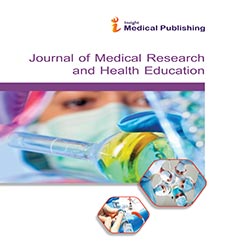Emerging Trends in Personalized Medicine and Patient Education
Bella Awang*
Department of Health and Environmental Sciences, Auckland University of Technology, Auckland 0627, New Zealand
*Corresponding author:
Bella Awang,
Department of Health and Environmental Sciences, Auckland University of Technology, Auckland 0627, New Zealand,
E-mail: Awing.bella@aut.ac.nz
Received date: February 03, 2025, Manuscript No. ipjmrhe-25-20731; Editor assigned date: February 05, 2025, PreQC No. ipjmrhe-25-20731 (PQ); Reviewed date: February 10, 25, QC No. ipjmrhe-25-20731; Revised date: February 17, 2025, Manuscript No. ipjmrhe-25-20731 (R); Published date: February 24, 2025, DOI: 10.36648/2393-8862.9.1.05
Citation: Awang B (2025) Emerging Trends in Personalized Medicine and Patient Education. J Med Res Health Educ Vol. 9 No.1:05
Introduction
Personalized medicine, also referred to as precision medicine, represents a transformative approach in healthcare that tailors prevention, diagnosis and treatment strategies to the individual characteristics of each patient. This approach considers genetic, epigenetic, environmental and lifestyle factors, moving away from the traditional â??one-size-fits-allâ? model of care. As personalized medicine advances, patient education becomes increasingly critical, ensuring that individuals understand their unique health profiles, the rationale behind tailored interventions and the potential benefits and risks of personalized therapies. Emerging technologies, including genomic sequencing, biomarker identification and digital health platforms, are accelerating the adoption of personalized medicine, while simultaneously transforming the way patients engage with their own healthcare. By integrating education into personalized care strategies, clinicians empower patients to actively participate in decision-making, adhere to individualized treatment plans and achieve optimal health outcomes [1].
Description
One of the most prominent drivers of personalized medicine is genomic and molecular profiling. Advances in high-throughput sequencing technologies have enabled clinicians to identify patient-specific genetic variations, susceptibility to diseases and potential responses to pharmacologic therapies. Pharmacogenomics, a subfield of personalized medicine, examines how genetic differences influence drug metabolism and efficacy, allowing for precise medication selection, dosing and minimization of adverse effects. Patient education in this context involves explaining genetic testing results, potential risks and benefits and the implications for treatment choices. Effective communication ensures that patients understand complex genetic information and can make informed decisions aligned with their personal values and preferences [2].
Biomarker-driven therapies are another emerging trend in personalized medicine. Biomarkers, including proteins, metabolites, or circulating tumor DNA, provide insights into disease progression, treatment response and prognosis. For instance, in oncology, biomarker testing can guide the selection of targeted therapies and immunotherapies, improving efficacy while reducing unnecessary exposure to ineffective treatments. Patient education in these settings focuses on interpreting biomarker results, understanding personalized treatment plans and recognizing early signs of treatment response or complications. Tailored educational materials, decision aids and counseling sessions enhance comprehension and adherence, ultimately improving clinical outcomes [1]. Digital health technologies are revolutionizing patient education and engagement in personalized medicine. Mobile health applications, wearable devices and telehealth platforms enable real-time monitoring of physiological parameters, medication adherence and lifestyle behaviors. These tools provide individualized feedback, reminders and educational content tailored to each patientâ??s health profile. For example, a diabetic patient may receive personalized dietary recommendations, glucose monitoring alerts and exercise prompts based on continuous glucose monitoring data. Patient education in digital health extends beyond information dissemination to interactive, real-time support that empowers patients to manage their health proactively.
Artificial Intelligence (AI) and machine learning are increasingly integrated into personalized medicine, offering predictive analytics and decision support. AI algorithms can analyze large datasets from electronic health records, genomic data and wearable devices to predict disease risk, suggest preventive strategies and personalize treatment recommendations. Patient education in AI-driven healthcare involves explaining algorithmic insights, potential uncertainties and evidence-based recommendations in an understandable manner.
Transparent communication builds trust and encourages patients to engage actively with AI-supported care while understanding the limitations and ethical considerations of algorithmic decision-making. Personalized medicine also emphasizes patient-centered care, where individual preferences, goals and social determinants of health inform treatment decisions. Shared decision-making is central to this approach, requiring effective education and counseling. Decision aids, visual tools and interactive platforms help patients compare treatment options, understand risks and benefits and make informed choices aligned with their values. Personalized education ensures that patients not only receive tailored medical interventions but also comprehend their significance, fostering adherence and engagement [2].
Conclusion
Emerging trends in personalized medicine are reshaping healthcare by tailoring interventions to individual genetic, molecular, environmental and lifestyle factors. These advancements demand robust patient education strategies that enhance understanding, engagement and adherence. Genomic profiling, biomarker-driven therapies, digital health platforms, AI analytics and personalized behavioral interventions enable clinicians to deliver precision care while educating patients on the significance of individualized treatment.
Effective patient education addresses clinical, ethical and social dimensions, ensuring informed decision-making, shared responsibility and long-term adherence. Interprofessional collaboration, culturally sensitive communication and continuous evaluation enhance the impact of personalized education strategies. As personalized medicine continues to evolve, integrating patient education as a central component ensures that individuals are empowered to actively participate in their healthcare, make informed choices and achieve optimal health outcomes, ultimately transforming both individual and population-level health.
Acknowledgement
None.
Conflict of Interest
None.
References
- Filippakopoulos P, Qi J, Picaud S, Shen Y, Smith WB, et al. (2010) Selective inhibition of BET bromodomains. Nature 468: 1067-1073.
Google Scholar Cross Ref Indexed at
- Nicodeme E, Jeffrey KL, Schaefer U, Beinke S, Dewell S, et al. (2010) Suppression of inflammation by a synthetic histone mimic. Nature 468: 1119-1123.
Open Access Journals
- Aquaculture & Veterinary Science
- Chemistry & Chemical Sciences
- Clinical Sciences
- Engineering
- General Science
- Genetics & Molecular Biology
- Health Care & Nursing
- Immunology & Microbiology
- Materials Science
- Mathematics & Physics
- Medical Sciences
- Neurology & Psychiatry
- Oncology & Cancer Science
- Pharmaceutical Sciences
